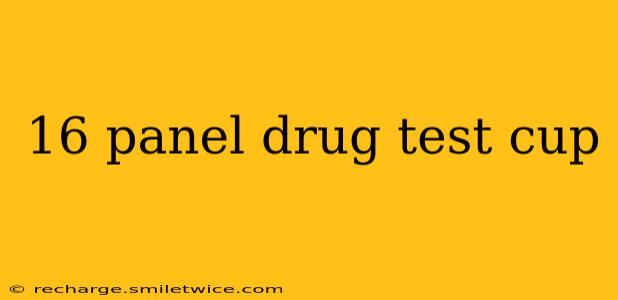Drug testing has become increasingly prevalent in various sectors, from employment screening to substance abuse monitoring. Understanding the intricacies of different drug tests is crucial for both employers and employees. This guide delves into the details of a 16-panel drug test cup, explaining its functionality, accuracy, and limitations.
What is a 16-Panel Drug Test Cup?
A 16-panel drug test cup is a single-use device designed for rapid, on-site detection of multiple drugs in urine. Unlike more complex lab tests, these cups offer a quick, relatively inexpensive method for screening individuals. The "16-panel" refers to the number of different substances the test can detect. This typically includes a wide range of commonly abused drugs, both illicit and prescription medications.
What Drugs Does a 16-Panel Drug Test Detect?
The specific drugs included in a 16-panel test can vary slightly between manufacturers, but generally, it screens for a combination of the following:
- Opiates: Morphine, Codeine
- Amphetamines: Amphetamine, Methamphetamine
- Methadone: A synthetic opioid used to treat opioid addiction.
- Cocaine: Including metabolites like benzoylecgonine.
- Marijuana (THC): Detects the presence of tetrahydrocannabinol.
- Barbiturates: A class of sedative-hypnotic drugs.
- Benzodiazepines: A class of anti-anxiety and sedative-hypnotic drugs.
- Propoxyphene: An opioid analgesic.
- Phencyclidine (PCP): A dissociative anesthetic.
- Methaqualone: A sedative-hypnotic drug.
- Oxycodone: An opioid pain reliever.
- Hydrocodone: An opioid pain reliever.
- Buprenorphine: A partial opioid agonist used to treat opioid addiction.
- Ecstasy (MDMA): A stimulant and hallucinogen.
- Other potential drugs: Some manufacturers may include additional drugs based on the specific needs of the testing environment.
It's important to note that the specific cutoff levels for each drug can vary depending on the manufacturer and the test's design.
How Accurate Are 16-Panel Drug Tests?
16-panel drug tests are generally considered reliable for initial screening purposes, providing a quick indication of potential drug use. However, they are not perfect and have limitations. A positive result on a 16-panel cup test should be confirmed with more definitive laboratory testing (e.g., gas chromatography-mass spectrometry (GC-MS)) to ensure accuracy. These confirmatory tests are more sensitive and specific. False positives are possible due to the presence of other substances that might cross-react with the test reagents.
What are the Limitations of 16-Panel Drug Tests?
Several limitations need to be considered:
- Sensitivity: These tests may not detect very low levels of drug metabolites.
- Specificity: Cross-reactivity with other substances can lead to false-positive results.
- Time Sensitivity: The detection window for different drugs varies greatly, depending on factors like metabolism and the drug's half-life.
- Chain of Custody: Ensuring the integrity of the sample from collection to testing is crucial for legal purposes. Improper handling can compromise the results.
What Happens if a 16-Panel Drug Test is Positive?
A positive result on a 16-panel drug test usually triggers further investigation, typically involving more sophisticated laboratory testing to confirm the initial findings. The specific consequences of a positive test depend on the context – employment, legal, or medical – and the applicable rules and regulations.
Can a 16-Panel Drug Test Detect Synthetic Cannabinoids?
While many 16-panel tests include a broad panel, the inclusion of specific synthetic cannabinoids varies among manufacturers. Some tests might detect certain synthetic cannabinoids, but not all. It's important to check the manufacturer's specifications for the specific drugs covered by a particular test.
How Long Do Drugs Stay in Your System?
The length of time a drug remains detectable in urine varies significantly based on many factors, including the type of drug, the frequency and amount of use, individual metabolism, and hydration levels. It's crucial to note that detection windows are only estimates; individual results can differ greatly.
This information is for educational purposes only and should not be considered medical or legal advice. Always consult with a healthcare professional or legal expert for any specific concerns.
